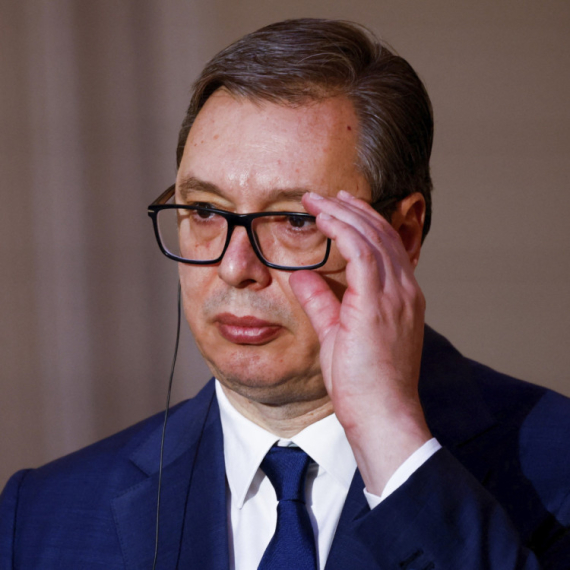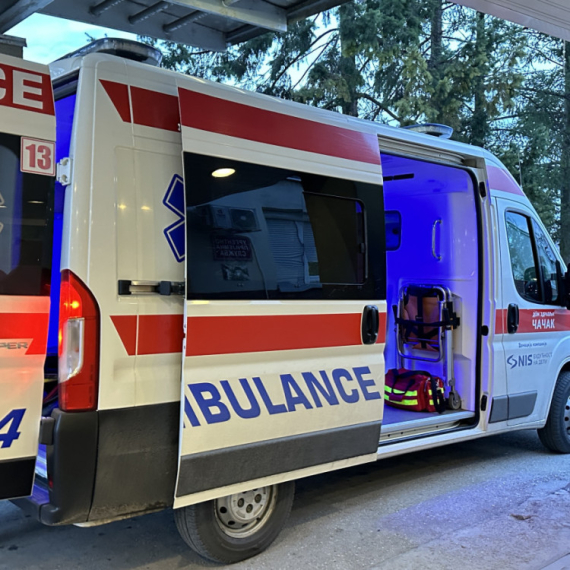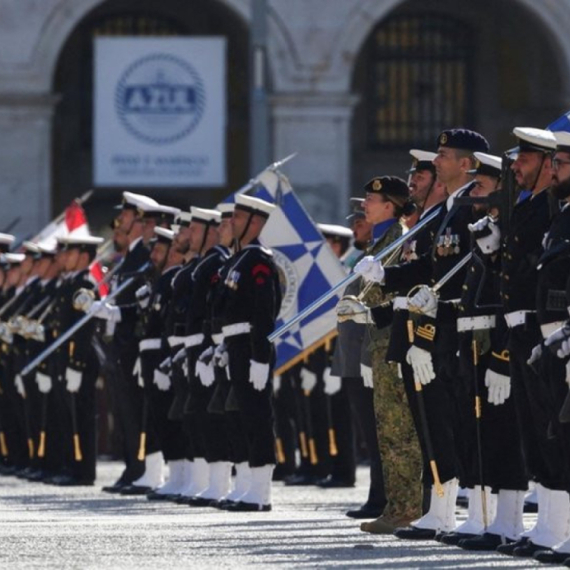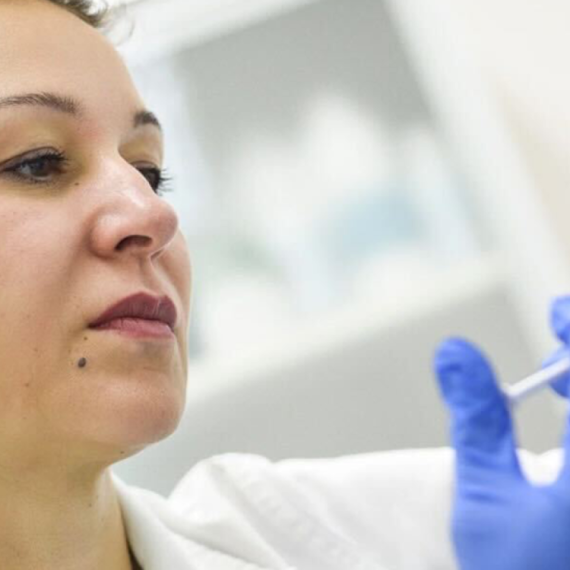Kravchenko discusses new goals for NIS
Serbian Oil Industry (NIS) CEO Kiril Kravchenko told B92 that thus far, more than 1,000 employees are interested in leaving the company voluntarily.
Saturday, 01.08.2009.
16:30

Serbian Oil Industry (NIS) CEO Kiril Kravchenko told B92 that thus far, more than 1,000 employees are interested in leaving the company voluntarily. This week was busy for NIS, with Dmitry Malishev leaving the board of directors, the sale of products from various warehouses, announced restructuring in the company, and the securing of RSD 12mn for the Petnica research center as well. Kravchenko discusses new goals for NIS In an exclusive interview with B92, Kravchenko said that that the fact that he has a degree in sociology and a doctorate in economy has helped him greatly in his job. “That is important because I am firstly working with people, and economy is just a measuring instrument. Sociology is more important if you take into consideration the understanding of cultural characteristics and the traits of people, how to make a good team, and how to create a good atmosphere for an international collective. Knowing personal traits is one of the most important strategic things which every administrator must know,” he said. Kravchenko said that the way of working in Serbia is closer to the way people work in Europe than Russia, because of traditions, from the work time to the practical approach to a job. “Other than differences related to geography, there are some similarities that tie us. We have Slavic roots, big hearts, we love to work and we love to relax,” Kravchenko said. “When speaking of differences, at this moment, Serbia is in a very active phase, along with integration into the international structure. All changes that are happening now are happening a lot faster than in the last ten years. I am sure that in three years, this will be a completely different country. We are now witnesses to a large change which will lead to a better future and I believe that NIS is capable of adding to that,” he said. Asked how the restructuring of NIS is going, Kravchenko said that the new administration has made an analysis of the structure of the executive system and agreed that the number of people employed in the administration is greater than is necessary. “We have two possibilities: the first is to prequalify a portion of these people for jobs we really need, and the other is in accordance with the law for the social program, to offer people to leave the company voluntarily, with a large severance pay. That speaks volumes on our humane approach to the problem,” he said. He said that there are about 2,000 unnecessary workers in NIS. “We have received more than 1,000 requests to leave the company, and we will try to keep those that are most needed. If some people need help for prequalification, or in later employment, we will try to help there too,” Kravchenko said. Commenting on what has been found in old NIS warehouses, he said that he is still not sure about all the things that can be found in these storage facilities. “We know that there are conditions for optimizing these reserves. If we look at the differences, then we have reserves for some things for more than a year, and some things we will need in less than a month. Our task is to free everything that we do not need and to distribute the assets into a program related to our development on the market of fuel products. If you asked if we are shocked, we are, but I believe that is a normal job for the team for optimizing the reserve in relation to the new goals of the company,” Kravchenko said. Kravchenko is 33 years-old, and says that he has already had a chance to get to know various regions of Serbia. “I was in the mountains and in Subotica, I was in southern Serbia, not only on business but during the weekend. Serbia is very varying and it is a great pleasure for me to get to know its various parts. Unfortunately, all of my weekends cannot be used for visits, I usually have to work, but whenever I can, I travel,” he said, adding that he will try to learn the language as soon as possible. “I think I am making progress. I understand, but I still cannot speak. At least, I need translations only when I have to say what I am thinking, but I can understand everything. I promise that I will be speaking Serbian by the end of the year—with mistakes, but I will be speaking,” he concluded.
Kravchenko discusses new goals for NIS
In an exclusive interview with B92, Kravchenko said that that the fact that he has a degree in sociology and a doctorate in economy has helped him greatly in his job.“That is important because I am firstly working with people, and economy is just a measuring instrument. Sociology is more important if you take into consideration the understanding of cultural characteristics and the traits of people, how to make a good team, and how to create a good atmosphere for an international collective. Knowing personal traits is one of the most important strategic things which every administrator must know,” he said.
Kravchenko said that the way of working in Serbia is closer to the way people work in Europe than Russia, because of traditions, from the work time to the practical approach to a job.
“Other than differences related to geography, there are some similarities that tie us. We have Slavic roots, big hearts, we love to work and we love to relax,” Kravchenko said.
“When speaking of differences, at this moment, Serbia is in a very active phase, along with integration into the international structure. All changes that are happening now are happening a lot faster than in the last ten years. I am sure that in three years, this will be a completely different country. We are now witnesses to a large change which will lead to a better future and I believe that NIS is capable of adding to that,” he said.
Asked how the restructuring of NIS is going, Kravchenko said that the new administration has made an analysis of the structure of the executive system and agreed that the number of people employed in the administration is greater than is necessary.
“We have two possibilities: the first is to prequalify a portion of these people for jobs we really need, and the other is in accordance with the law for the social program, to offer people to leave the company voluntarily, with a large severance pay. That speaks volumes on our humane approach to the problem,” he said.
He said that there are about 2,000 unnecessary workers in NIS.
“We have received more than 1,000 requests to leave the company, and we will try to keep those that are most needed. If some people need help for prequalification, or in later employment, we will try to help there too,” Kravchenko said.
Commenting on what has been found in old NIS warehouses, he said that he is still not sure about all the things that can be found in these storage facilities.
“We know that there are conditions for optimizing these reserves. If we look at the differences, then we have reserves for some things for more than a year, and some things we will need in less than a month. Our task is to free everything that we do not need and to distribute the assets into a program related to our development on the market of fuel products. If you asked if we are shocked, we are, but I believe that is a normal job for the team for optimizing the reserve in relation to the new goals of the company,” Kravchenko said.
Kravchenko is 33 years-old, and says that he has already had a chance to get to know various regions of Serbia.
“I was in the mountains and in Subotica, I was in southern Serbia, not only on business but during the weekend. Serbia is very varying and it is a great pleasure for me to get to know its various parts. Unfortunately, all of my weekends cannot be used for visits, I usually have to work, but whenever I can, I travel,” he said, adding that he will try to learn the language as soon as possible.
“I think I am making progress. I understand, but I still cannot speak. At least, I need translations only when I have to say what I am thinking, but I can understand everything. I promise that I will be speaking Serbian by the end of the year—with mistakes, but I will be speaking,” he concluded.






























Komentari 2
Pogledaj komentare